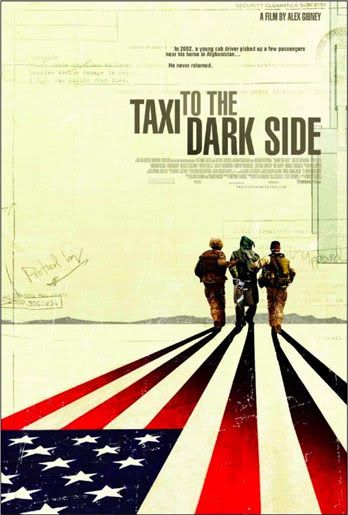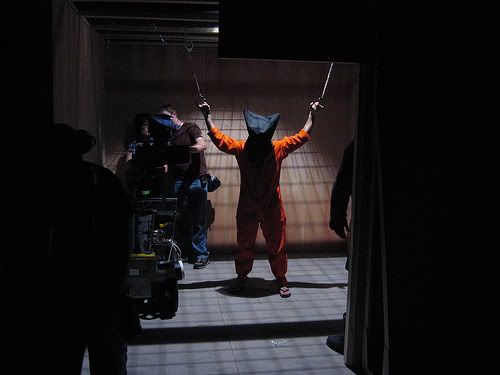Taxi to the Dark Side

Title: Taxi to the Dark Side
Rating: 4/5
Genre: Documentary
Director: Alex Gibney
 Before you cry “oh no, another documentary on Afghanistan” in that do-we-really-need-another sense, it should be pointed out this isn't some broad elaboration on how it started or anything of the sort. Instead it focusses very specifically on the cases of torture by the American army towards the Afghan detainees in both Guantanamo Bay as well as in Badrul, Abu Ghraid, and other detainment camps in Afghanistan. Perhaps most importantly though, is it doesn't seem concerned with taking sides; there is no vilification of the US soldiers, no mention of the requited treatment of American POWs, and it remains remarkably unbiased in its views, which is no small feat when given how high up the governmental ladder many of the orders came from.
Before you cry “oh no, another documentary on Afghanistan” in that do-we-really-need-another sense, it should be pointed out this isn't some broad elaboration on how it started or anything of the sort. Instead it focusses very specifically on the cases of torture by the American army towards the Afghan detainees in both Guantanamo Bay as well as in Badrul, Abu Ghraid, and other detainment camps in Afghanistan. Perhaps most importantly though, is it doesn't seem concerned with taking sides; there is no vilification of the US soldiers, no mention of the requited treatment of American POWs, and it remains remarkably unbiased in its views, which is no small feat when given how high up the governmental ladder many of the orders came from.Much of the documentary has a focus on a man named Dilawar; barely out of his teenage years, the taxi driver was detained by Afghan troops who suspected him of a recent attack, claiming the broad ransom for all Al-Qaeda on him placed by US forces and sent to Badrul where he was cruelly tortured to death. The horrifying thing here is not the treatment he was subjected to, but the fact that throughout it all, none of the soldiers responsible believed he had any information or was even guilty of any crime, but acted through pressure placed upon them. Unauthorized torture techniques were commonly employed as a means to extract information and despite governmental awareness of the situation, went on with their approval until media pressure forced action, and the result was the soldiers taking the fall.
But the actual degrading treatment of the detainees – not even convicted of any crime but merely suspects and given no trial – is really only one half of the story, and the shadowy behind the scenes actions of the Bush administration is really what's being explored. It would have been easy to portray them as malicious in their intent, but that's a picture that's never really painted. Instead they seem all the more incompetent in this respect; the justification of cruel torture in one specific case rapidly propagating into permissible for all suspects, and the distinct lack of boundaries upon what techniques they are allowed to use to obtain their information resulting in a free for all filled with sleep deprivation, sensory deprivation, waterboarding (stimulating the sense that a suspect is drowning), preying on fears, sexual torture and savage physical assault.
After everything is unfolded, and we learn the result of the soldiers following their orders; given no details or training as to how to carry out their objectives, put under a constant
 pressure to get results and to receive no correction during the multiple observations of the facility by higher powers, the documentary takes a subtle twist. It's no longer just about inhuman practices during times of war or how deplorable conditions were allowed to get too far, it shows how fear is able to break down democracy. There was no democratic process to the orders given to the soldiers, no authorization given – except at best by the Secretary of Defence at the time – and no questions asked when the events came out in clear opposition to the Geneva convention. If it could all be swept under the carpet it would be, and this more than anything is what I find worrying. If the US wants to continue to hold their head up high, more so now than ever, they need to prove that they are on the right side of the war.
pressure to get results and to receive no correction during the multiple observations of the facility by higher powers, the documentary takes a subtle twist. It's no longer just about inhuman practices during times of war or how deplorable conditions were allowed to get too far, it shows how fear is able to break down democracy. There was no democratic process to the orders given to the soldiers, no authorization given – except at best by the Secretary of Defence at the time – and no questions asked when the events came out in clear opposition to the Geneva convention. If it could all be swept under the carpet it would be, and this more than anything is what I find worrying. If the US wants to continue to hold their head up high, more so now than ever, they need to prove that they are on the right side of the war.
Comments
Post a Comment